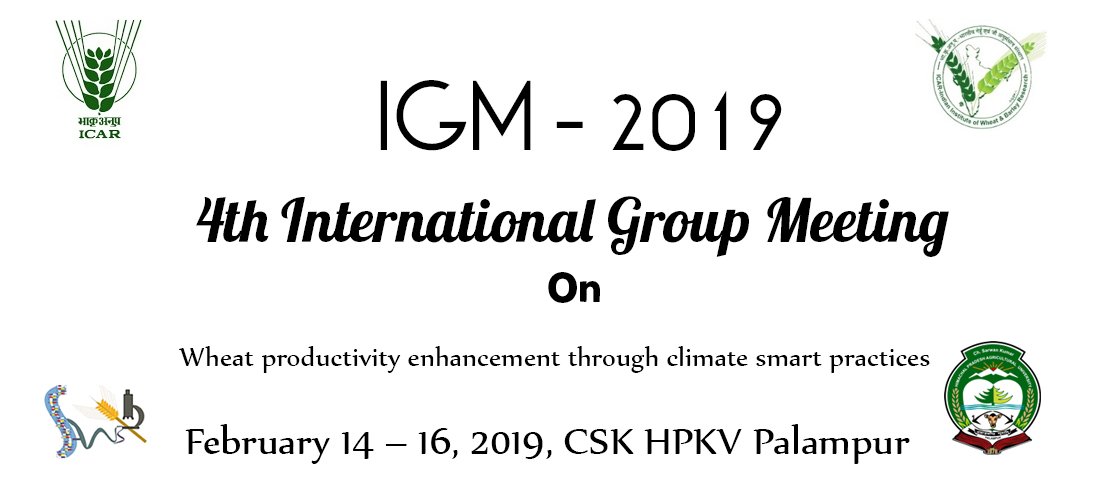
Focusing on different issues of wheat productivity & changing climate, Indian Institute of Wheat and Barley Research (IIWBR), Society for Advancement of Wheat and Barley Research (SAWBAR), and CSK Himachal Pradesh Agricultural University (CSKHPKV) have decided to organize this International Group meeting on the theme “Wheat productivity enhancement through climate smart practices” The meeting will bring scientists, extension workers, farming community, traders, government and non-government agencies and policy makers on common platform to create awareness of the impact of climate change and to develop strategies to enhance productivity, quality and value addition.
Wheat research in India started in an organized manner during 1905 with the joining of Sir Howard as the Imperial Agricultural Botanist at Imperial Agricultural Research Institute, Pusa, Bihar. With the establishment of Imperial Council of Agricultural Research in 1929 (now ICAR) which is the main funding agency for agricultural research and education, All India Coordinated Wheat Improvement Project was initiated in 1965 to focus on wheat research in the country. In the beginning, the headquarter was located at Indian Agricultural Research Institute, New Delhi and it attained the status of Project Directorate in 1978 which is now located at Karnal (Haryana). With a view to focus research in Barley, the AICWIP was re-nominated as All India Co-ordinated Wheat and Barley Improvement Project. With the concerted efforts of dedicated scientists, the Directorate of Wheat Research (recently elevated to Indian Institute of Wheat & Barley Research) has been able to release 412 wheat varieties till date to suit different agro-climatic and agro-ecological conditions in India. In addition, due importance was also given to protection technologies, quality improvement and resource management, which helped in raising the wheat production from a mere 10.4 million tons during 1965 to 97.70 million tons during 2018. In spite of the best efforts, the crop productivity has however remained stagnant. Therefore, it is urgently needed to raise the wheat productivity for ensuing food security for our ever increasing population. Climate change is one of the major challenges facing humanity in the future and effect of climate change has been detrimental to agriculture. Wheat is an important crop worldwide and climate change is expected to be a major threat to wheat productivity. Main focus so far was given on developing good quality high yielding varieties of wheat with diseases resistance. However, it is time to study the effect of climatic and edaphic variables viz., heat, drought, salinity and water logging on wheat production. It is vital to develop climate resilient varieties that are better suited to changing climate given as well efficient in utilization of micronutrients and fit for value addition. At the same time, it is also essential that Indian wheat quality should match to higher standards of Australian and North American bread wheat. Under the circumstances there is an urgent need to develop strategies to alleviate such environmental changes not only to sustain but also to boost the productivity.
Technical Programme: The technical programme will consist of key speakers, lead speakers and oral/poster presentations on recent advances and highlighting challenges due to climate change. The three-day programme will be organized under the following thematic areas:
Themes :
- Genetic manipulation to mitigate effects of climate change
- Biotic stresses in changing climatic scenario
- Abiotic stresses in relation to climate change
- Resource optimization for enhanced productivity
- Changing food habits and value addition for quality improvement
- Impact of climate change on adoption and sustainable production
The organizers of 4th International Group Meeting on “Wheat productivity enhancement through climate smart practices” invite abstracts from interested persons engaged in research, development, marketing, finance, export organizations and industries representing wheat. Abstracts will be evaluated by a group of eminent professionals for their suitability for oral/poster presentation. Authors are requested to specify the relevant thematic area in which the paper needs to be considered. Abstract may be submitted as a MS Word file attached to an e-mail to Organizing Secretary at gs.sawr@gmail.com. The format for sending the abstract can be downloaded from website: http://www.sawbar.in/4thIGM or http://www.iiwbr.org/4th IGM. The last date for submitting abstracts is November 30, 2018.
Venue: CSK Himachal Pradesh Agricultural University, Palampur
Accomodation :
Visa requirements: All foreign delegates need a valid passport and Indian visa. Invitation letter, if required for participating in the meeting will be made available on request.
Register:-
- Registration Fee Participants Before December 15, 2018
- With late fee up to Jan 31, 2019
- On spot registration
| Participants | Participants Before December 15, 2018 | With late fee up to Jan 31, 2019 | On spot registration |
| Indian Delegates | |||
Registration Fee includes: –
Last date for submitting abstracts -> November 30, 2018
Registration: early bird: -> Before December 15, 2018
Registration: with Late Fee -> Jan 31, 2019
IGM Date: -> February 14-16, 2019
